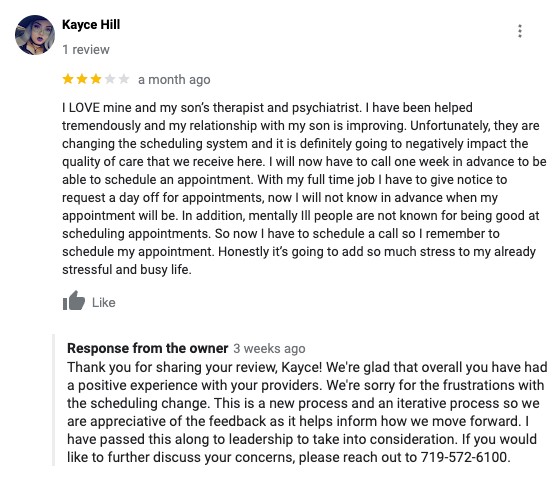
Why It’s Important to Respond to Every Google Review for SEO
Summary
We often get this question from clients, "How can I get rid of negative Google reviews associated with my business listing?" Read on to learn how.
We often get this question from clients, “How can I get rid of negative Google reviews associated with my business listing?” It’s concerning to see a client, customer or patient express their anger in online reviews on public channels. Getting rid of negative Google reviews, however, can be challenging as Google generally does not remove reviews unless they violate their review policies. But before we offer some recommendations on how to push those negative customer reviews down to the bottom of the list, it’s important to explain why it’s important to respond to all Google review and what it can do for your business.
Responding to Google reviews is important for several reasons:
1. Engaging with customers: It shows that you value your customers’ feedback and are actively listening to their concerns or compliments. It demonstrates a customer-centric approach and a willingness to engage in a dialogue.
2. Building trust and credibility: When potential customers see that a business actively responds to reviews, it gives them confidence that their opinions will be acknowledged and addressed. This helps build trust in your brand and establishes credibility.
3. Improving customer experience: By responding to reviews, you can gain valuable insights into your customers’ experiences and identify areas for improvement. It allows you to address any negative feedback promptly and find ways to enhance your products, services, or customer support.
4. Strengthening relationships: Responding to positive reviews not only shows appreciation for customers’ support but also strengthens the relationship with them. It can encourage customer loyalty and increase the likelihood of repeat business.
5. Mitigating negative impact: Negative reviews can have a significant impact on your business reputation if left unaddressed. By responding to negative reviews in a professional and constructive manner, you have an opportunity to rectify any issues, provide solutions, or offer apologies if necessary. This proactive approach can help minimize the negative impact and demonstrate your commitment to customer satisfaction.
6. SEO and online visibility: Google reviews contribute to your business’s online presence and search engine optimization (SEO). Responding to reviews helps keep your business listing active and engaged, signaling to search engines that your business is actively managing its online presence. This can potentially improve your visibility in Google search results.
Benefits of Google Reviews on Your SEO
Google reviews can have a positive impact on your business’s search engine optimization (SEO) in several ways. Google reviews can contribute to your business’s visibility in local organic search results. When users search for businesses or services in their area, the Google search algorithm takes into account various factors, including the review quantity and quality, to determine which local businesses to display. Positive reviews can improve your chances of higher rankings in local search results, increasing your visibility to potential customers.
- Positive reviews, especially when they include star ratings, can enhance the click-through rates (CTRs) of your search results. When users see positive ratings and reviews in the search results, they are more likely to click on your listing, leading to increased organic traffic to your website or business page.
- Google reviews contribute to the generation of user-generated content, which search engines tend to favor. The reviews provide fresh and relevant content related to your business, including keywords and phrases that potential customers might use when searching for your products or services. This user-generated content can help search engines understand the nature of your business and improve your organic search rankings.
- They also often contain specific details and descriptions of customers’ experiences with your business. These testimonials may include long-tail keywords, which are longer and more specific search queries. When these keywords appear in your reviews, they can help optimize your business for relevant long-tail searches and improve your chances of ranking for those queries.
- Positive reviews act as social proof and establish credibility for your business. When potential customers see that others have had positive experiences with your business, it enhances their trust and confidence in your brand. This, in turn, can lead to increased engagement, longer dwell times on your website, and potentially higher conversion rates—all of which are positive signals for search engines.
- Finally, Google reviews are an integral part of your Google My Business profile. An optimized GMB profile with a healthy number of positive reviews can enhance your local SEO efforts. It provides search engines with more information about your business, such as your address, phone number, website, and customer feedback, thereby increasing your visibility in local search results.
It’s worth noting that while Google reviews can contribute to your SEO efforts, they are just one aspect of a comprehensive SEO strategy. It’s essential to focus on other SEO factors such as high-quality content, relevant keywords, backlinks, and technical optimization to achieve optimal results.
Responding to Google reviews, therefore, is an opportunity to showcase your commitment to customer satisfaction and continuous improvement. While you cannot remove a negative review, you have the opportunity to respond to it. When responding to a negative Google review, it’s important to approach the situation with professionalism, empathy, and a focus on resolving the issue.

Here are some guidelines to follow:
1. Respond promptly: Address the negative review as soon as possible to show that you take customer feedback seriously and are actively working to address the concern.
2. Thank the reviewer: Start by expressing gratitude for the customer’s feedback. Regardless of the negative sentiment, acknowledging their time and effort shows that you value their input.
3. Apologize and empathize: Offer a sincere apology for the customer’s negative experience. Show empathy and understanding for their frustration or disappointment. This demonstrates that you genuinely care about their satisfaction.
4. Address the specific concerns: Address the customer’s concerns raised in the review. Be specific in your response, acknowledging the issues they mentioned. Avoid generic or copy-paste responses.
5. Offer a solution: Propose a solution or provide options to resolve the issue. This might involve offering a refund, a replacement, a discount, or any other appropriate remedy based on the situation. Make it clear that you are committed to making things right.
6. Take the conversation offline: Encourage the reviewer to reach out to you directly to discuss the matter further. Provide contact information or direct them to a customer support channel. This allows for a more personalized and private conversation.
7. Stay professional: Maintain a calm and professional tone in your response, even if the reviewer’s comments are harsh or unfair. Avoid getting defensive, arguing, or engaging in a public back-and-forth. Remember that your response is visible to others and can influence their perception of your business.
8. Follow up: After resolving the issue, consider following up with the customer to ensure their satisfaction. This gesture shows that you genuinely care about their experience and are committed to providing excellent customer service.
By following these guidelines, you can demonstrate your commitment to customer satisfaction, show a willingness to address concerns, and potentially turn a negative experience into a positive one. Here’s an example of a response to a negative customer review:
Dear [Reviewer’s Name],
Thank you for taking the time to provide feedback about your recent experience with our business. We sincerely appreciate your input as it helps us identify areas for improvement.
We apologize for the inconvenience and frustration you encountered during your visit. We strive to provide excellent service, and we regret that we fell short of your expectations. Your feedback is valuable to us, and we take it seriously.
We would like to personally address your concerns and make things right. Please reach out to our customer support team at [phone number or email] so that we can further discuss the issue and find a suitable solution. We are committed to resolving this matter to your satisfaction.
Once again, we apologize for any inconvenience caused and appreciate your understanding. We hope to have the opportunity to rectify this situation and regain your trust.
Best regards, [Your Name] [Your Position/Title] [Business Name]

Now that you’re responding to every review, positive and negative, how can you bury those negative reviews?

The best way is to encourage positive reviews to significantly outnumber the negative ones. Build a program that focuses on generating a consistent stream of positive reviews from satisfied customers. This can help dilute the impact of negative reviews over time. Encourage happy customers to leave reviews by providing excellent service, using email or in-store signage to request feedback, or including links to your Google review page on your website or social media platforms. Often times, businesses will offer incentives for a Google review, such as a gift card to a local coffee shop or a discount on the next purchase.
If you have successfully addressed the concerns of a dissatisfied customer and resolved the issue, you can politely request them to consider updating their review to reflect the positive outcome. While it’s at the reviewer’s discretion, some may be willing to update their review if their concerns have been addressed.




